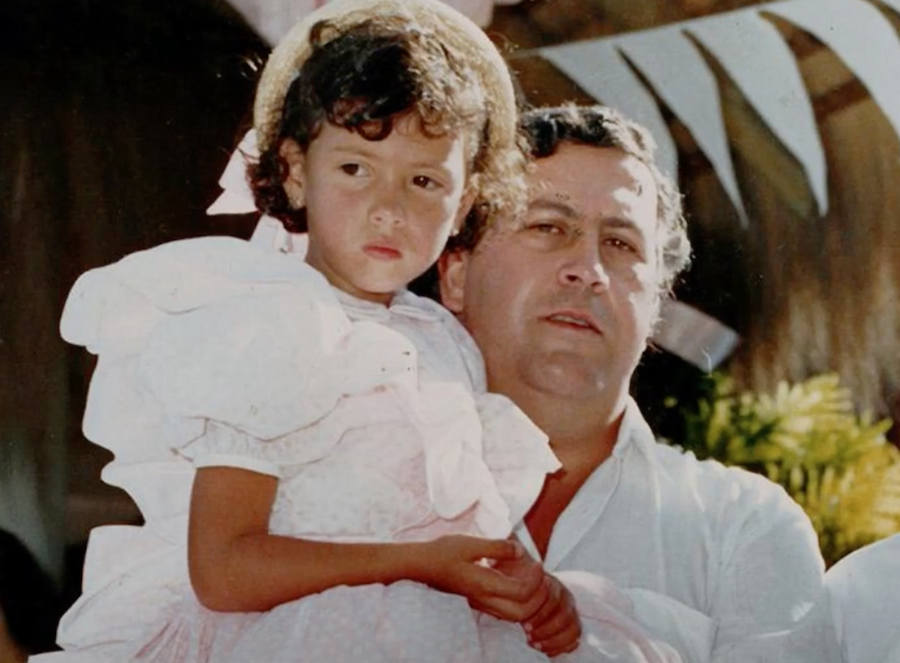Can a life be irrevocably shaped by the actions of another, even when that individual has committed no crime? This is the perplexing reality of Manuela Escobar, the daughter of the infamous Pablo Escobar, a figure whose life has been forever intertwined with a legacy of violence and notoriety.
Born on May 25, 1984, in Colombia, Manuela arrived into the world during the peak of her father's illicit empire. While her contemporaries enjoyed childhoods of relative innocence, Manuela experienced a life of unparalleled luxury and privilege. She was her father's beloved "princess," showered with extravagant gifts and shielded from the harsh realities of his profession. Yet, this gilded existence was destined to shatter, forever altering the course of her life.
| Category | Details |
|---|---|
| Full Name | Manuela Escobar Henao (also known as Juana Manuela Marroqun Santos) |
| Date of Birth | May 25, 1984 |
| Place of Birth | Medelln, Colombia |
| Parents | Pablo Escobar (Father) and Maria Victoria Henao (Mother) |
| Siblings | Juan Pablo Escobar (older brother, born 1977) |
| Known for | Being the daughter of Pablo Escobar, and for her life lived in the shadow of his infamy. |
| Current Status | Information on her current whereabouts is limited due to her desire for anonymity. |
| Key Events |
|
| Reference | Biography.com: Pablo Escobar |
Manuela's early years were a stark contrast to the lives of most children. She resided in opulent mansions, received extraordinary gifts, and enjoyed the constant attention of her powerful father. She once expressed a desire for a unicorn, a fantastical wish that, while impossible, exemplified the lengths to which Escobar would go to fulfill her desires. This upbringing, however, was built on a foundation of illicit activity, a truth that would eventually cast a long shadow over her future.
- Unforgettable Memories Tori Spellings Grand Wedding Day
- Josh Harts Family Background Meet His Parents
The world she knew crumbled on December 2, 1993, when Pablo Escobar was gunned down in Medelln. At just nine years old, Manuela's world was irrevocably altered. The extravagant lifestyle vanished, replaced by fear and the desperate need for survival. The family, facing both the wrath of Escobar's enemies and the legal repercussions of his actions, was forced into hiding.
In the aftermath of Escobar's death, Manuela, along with her mother and brother, embarked on a perilous journey, seeking refuge from the constant threat of violence. They initially sought asylum in several countries, including Germany and Mozambique, before eventually settling in Argentina. It was here that Manuela, along with her family, adopted new identities, attempting to escape the notoriety associated with their name.
The transition to a life of anonymity was a challenging one. The weight of her father's legacy proved to be an insurmountable burden. Although she had never committed a crime, Manuela was inextricably linked to her father's deeds. In 2015, it was revealed that she lived in constant fear of retaliation from the enemies of Pablo Escobar. Furthermore, reports surfaced indicating she had struggled with depression and had even attempted suicide, a testament to the emotional toll of her situation.
Manuela's story is a poignant reminder of the devastating impact of crime on families. It underscores the idea that the sins of the father can indeed be visited upon the children, even those who bear no personal guilt. It highlights the enduring power of a notorious legacy and the difficulties of escaping a past so deeply intertwined with violence and illegality.
Her older brother, Juan Pablo, who later changed his name to Sebastin Marroqun, has attempted to reconcile with the past, writing books and giving interviews about his experiences. However, Manuela has largely remained out of the public eye. This desire for privacy is understandable. It is a reflection of her attempt to create a life separate from the shadow of her father's actions, a life free from the fear and scrutiny that have defined her existence.
The Hacienda Npoles, once a symbol of Pablo Escobars power and wealth, serves as a physical manifestation of his legacy. This sprawling estate, built in the 1980s, was a testament to his immense fortune. The Colombian state recently expropriated it from Escobar's relatives. The fate of the estate reflects the wider narrative of Manuela's life. Once a place of lavish indulgence, it is now a reminder of a past that can no longer be sustained.
The circumstances of Manuela Escobar are exceptional, but the questions they raise are universally relevant. How do we define culpability? How do we distinguish between inherited guilt and personal responsibility? And how does a person build a life, a self, when forever defined by anothers actions? These are the questions that continue to surround Manuela Escobar, a woman whose life, in many ways, represents a tragedy.
The story of Manuela Escobar is not one that often features in the history books. She is not a celebrity, nor an inventor. But she is, in many ways, an ordinary person. She is a woman who bears the immense weight of a complex family history. She is a person who has had to endure the consequences of events over which she had no control.
Manuela's story is a stark reminder of the lasting effects of violence, and the enduring power of family, and the difficulty in escaping the shadow of the past. Her life is a testament to the idea that the effects of crime stretch far beyond the perpetrators, impacting innocent individuals in profound and lasting ways.
The story of Manuela Escobar is a cautionary tale, an exploration of the complexities of family, identity, and the enduring impact of a troubled past. It offers a glimpse into a life lived in the shadow of a notorious figure. Her experience reminds us of the far-reaching implications of criminality and the lasting impact on those touched by it.
- Mark Harmons Date Of Birth Explore The Life And Career Of The Renowned Actor
- Unveiling The Net Worth Of Renowned Actor Josh Lucas


